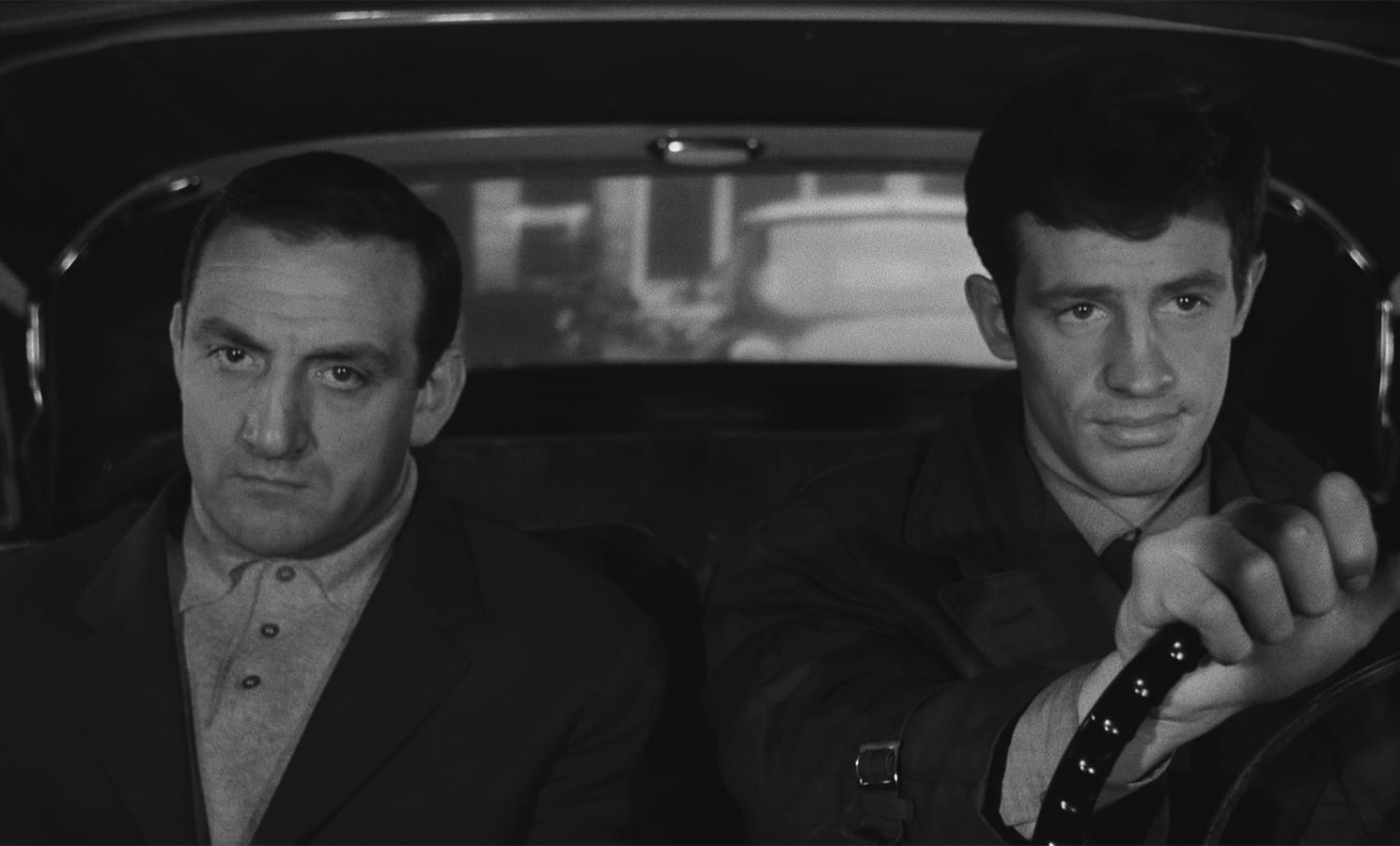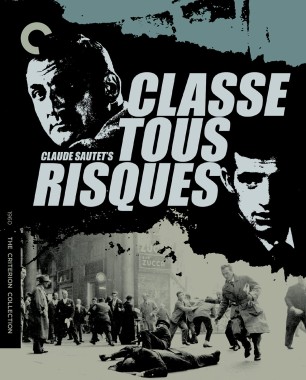Classe tous risques: Beautiful Friendships

I have a particular, even personal, relationship with this film. I experienced a shock of discovery when I first saw it and felt driven to write my first review about it. It was a short article, as the editor had requested, and probably superficial—I was young—but it was laudatory. It ended, “People say Classe tous risques is a B movie. Better B like Boetticher than A like Allégret.”
Nor was my reference to the director of Seven Men from Now a coincidence. Sautet shared Boetticher’s taste for ellipsis and stripped-down refinement, his narrative clarity and appetite for powerful emotions and marginal characters.
That first article was followed by my first interview. Discussing the influences that shaped the film, Sautet mentioned his love for the western Rio Bravo and told me he had asked Belmondo to see Seven Men from Now. Classe tous risques marked “the beginning of a beautiful friendship” that remained without a cloud, unwavering, until Sautet’s death. A double friendship, really, for some time later José Giovanni also became an important part of my life.
Along with Jean-Pierre Melville, Sautet was my mentor and guardian in the film business. He even went to see my parents to convince them to allow me to choose film rather than political science as my profession. Pierre Rissient and I served as his press agents. Once I became a director, I had him read my scripts and enrolled him in the large group of advisers—including Truffaut—who came to see my rough cuts. Sautet was the greatest script doctor and edit-fixer in French cinema. His comments were always stimulating. He invariably put his finger on what wasn’t working and swiftly found a solution. He fixed, patched, and improved a great many French films, and saved several from disaster.
Do not think I am straying off topic. Far from it. These exacting qualities, Sautet’s synthesizing mind, which didn’t shy away from emotion, underpin his first film and account for its strength and originality.
Yet Classe tous risques’ strength and originality were underestimated upon its initial release. It is true that gangster films had never been particularly popular with a whole segment of the French critical establishment. Journalists loyal to the Communist cause followed Georges Sadoul’s lead in routinely panning them, even those like Night and the City and Touchez pas au grisbi, directed by filmmakers close to the party, insisting it was better to take an interest in workers and tradesmen than in criminals. The Catholics saw in them a threat to morality, a danger to youth.
Sautet’s film was also eclipsed by Breathless, released just a few weeks before; all the credit for bringing out the talent of Jean-Paul Belmondo went to Godard, despite the fact that in Classe tous risques, Belmondo shows us a completely different side of his great gift as an actor, his remarkable versatility, by making credible an authoritarian character with radiant charm, by stunningly fusing virility and childlike innocence, in a performance that is in a totally different register from the one he gives in Breathless. I’ve never gotten over the way he turns to Sandra Milo, after having knocked out the man who was beating her, smiles that unforgettably disarming smile, and says, “The one good thing about me is my left.”
Four decades later, we’ve come to understand that Classe tous risques—in a less gaudy and obvious, more secretive, insidious way—was just as revolutionary as Breathless. Like Jacques Tourneur, Sautet was renewing the genre, profoundly, from the inside, instantly turning dozens of contemporary films into dusty relics. The long opening sequence, the gripping shots of the train station and the holdup in the streets of Milan, made it impossible to keep filming these kinds of happenings and the way characters behaved—even the way they walked down the street—as we used to do. Sautet had succeeded in infusing his action scenes with absolute authenticity, breathing such an incredible sense of real life into them that it is said they won him the admiration of Robert Bresson.
It must be noted that after some glorious standouts—Touchez pas au grisbi, Rififi, and, of course, the cool-as-ice, unclassifiable Bob le flambeur—the gangster film had seriously begun to run out of steam. It was being suffocated by cliché and routine. The hoodlum characters seemed contrived, the plots limp with exhaustion, cut off from any reality, without life or passion; the direction was lazy, the casts interchangeable. From time to time, one could get up a little enthusiasm for a film like Henri Decoin’s visually brilliant Razzia sur la chnouf, or Gas-Oil or Le désordre et la nuit, by Gilles Grangier, a modest filmmaker who turned out a few interesting things. But overall, tired formulas from the thirties were being retreaded, and the general tone was becoming rancid and bitter.
José Giovanni stepped into this situation and set about renewing the genre. José had firsthand experience of crime and prison: he had been sentenced to death for participating in a racketeering plot organized by his brother and uncle. The scheme had escalated, turned deadly, and although José himself had never killed anyone, he spent several months on death row, attempted a prison break, then waited to be guillotined. (I pushed José to write a script about this period and about waiting for certain death. I helped him write the script and make the film, Mon père, which, sadly, was his last.) He was pardoned by the president of the republic and saved himself from the underworld through writing. His first book, Le trou, written on his lawyer’s advice, described his failed prison break and received an enthusiastic reception from Jean Cocteau, Pierre Mac Orlan, and Roger Nimier. Jacques Becker turned it into a superb film, coscripted by José himself.
A few years later, I became José’s press agent and showed him an article by Gilles Jacob, who, before being appointed to the prestigious post of president of the Cannes Film Festival, had been an influential and insightful critic. In the article, Jacob tried to find the link between the three films he declared were the best of the French gangster genre—Le trou, Classe tous risques, and Le deuxième souffle. José answered that he might be the link, given that he had written all three novels, collaborated on two of the scripts, and that Le deuxième souffle was 98 percent faithful to his dialogue and plot construction.
Giovanni shook up a slumbering cinema. We were finally getting out of Pigalle. The characters of Classe tous risques try to survive in Italy, then travel all the way across France on a journey set to Georges Delerue’s stunning music. (The influence of the western is clearly felt in the parade of diverse landscapes.) Giovanni’s intimate knowledge of the underworld and his sense of reserve steered him away from clichés and, most importantly, focused all his stories on a few themes, which he treats in a highly emotional manner: survival, friendship, the dread of compromise or betrayal. He ignores the pasts of his characters. The only thing that matters is what they’re experiencing right now, in the most immediate present. The only other thing that matters is their dream: “a school for the children.” It would take more than twenty years for Sautet to discover that the character played by Lino Ventura is loosely based on Abel Danos, who collaborated with the infamous French Gestapo squad run by Bonny and Lafont.
Giovanni met Ventura through Becker. Ventura took an immediate interest in Classe tous risques. He suggested the film be directed by a well-known assistant director, Claude Sautet, whom he had met during the shoot of Le fauve est lâché, which Sautet had also coscripted. The director of that film, Maurice Labro, hated Ventura so much that he quit before the end of the shoot, leaving Sautet to shoot missing scenes, including the final chase and showdown—thereby significantly improving the film’s overall quality. Lino immediately picked up on Claude’s sense of space and framing and his skill at filming actors. He set up a meeting with José Giovanni.
“I asked him what was the first image that came to his mind after reading the book. He answered: ‘A man is walking down the street. Ten meters behind him, two children.’ He had immediately grasped the film’s emotional backbone. In a single sentence. I knew he couldn’t fail.”
The importance of familial feelings, of feelings plain and simple, sets Classe tous risques apart from other gangster movies of the time. Sautet turned his back on clichés. Unlike Melville, whose settings and discoveries were inspired by the films of Robert Wise and André de Toth, Sautet did not try to breathe new life into stereotypes by seeking his inspiration in American cinema. Classe tous risques heralds the films that would make Sautet deservedly famous, from César et Rosalie to Nelly et Monsieur Arnaud. In fact, this first film, though partially shaped by the influence of its remarkable novelist-screenwriter, is a particularly personal one, as his later films would be. There lies the mystery of directing.
Back to Giovanni: “Classe tous risques is the best film adaptation of any of my books. It doesn’t have any nightclub scenes. It doesn’t treat the subject as folklore. And it has more heart than Le deuxième souffle.”
You can feel the heart and emotion Giovanni praised in the admirable first voice-over, which has the same effect on me forty-eight years later, starting us right off with the point of view of a character, a secondary character, on her way out of the story—a female in this world of men, a woman whose fate will weigh heavily on our heroes: “She wanted to warn him to be careful. But what was the point? Since starting to pack and unpack, she’d said nothing. Or almost nothing. The children followed. They lacked for nothing, except a school.”
The voice-over then situates the two protagonists. And Sautet has the terrific idea of placing it over shots in which they’re filmed from behind, in the street—just as he later avoids the expected settings and conventional places linked to the mythology and clichés of the genre. He prefers anonymous hotel rooms, churches, and post offices. I refer, in particular, to that garret in which Abel hides and meets the little chambermaid played so movingly by Betty Schneider. A touching digression, totally unsentimental, a moment of grace that, like many other scenes, escapes from the dictatorship of plot but is emotionally indispensable. And draws attention to the film’s otherwise incredible elliptical rapidity, the bare bones of the end, with that voice-over that reaches into your guts and foreshadows Max et les ferrailleurs and Un cœur en hiver.
It’s a film that made me want to wrap my arms around its makers and become their friend.
Translated from the French by Nicholas Elliott. This piece originally appeared in the Criterion Collection’s 2008 edition of Classe tous risques.




